Poetry As Preservation of Slavonian Cultural Heritage and Tradition
31st of March 2022 - Meet Željko Čuljak, whose poetry and stories about the beauty of Slavonia and its residents aim to preserve the cultural heritage and tradition of his village Cerić and the whole Slavonian region.
We spoke with Željko in his home in the small village of Cerić, which is located near Vinkovci and has suffered a tragic fate. During the Homeland War, Cerić fell and was destroyed to the ground - residents lost everything and inevitably fled the enemy aggression which destroyed everything in their way. Željko, with his fellow fighters and villagers, stayed behind and helped to protect Nuštar, a nearby village that resisted tireless enemy attacks and led bloody battles that lasted for days. On the 5th of October in 1991, just a few days after surrounding villages fell to the enemy hands (Cerić and Marinci), Croatian defenders resisted enemy attacks and, in the end, managed to protect the village from aggressors. This event is forever inscribed in the history books of the Homeland War as the “Battle of Nuštar”, which was one of the biggest wins of the Croatian army in an effort to protect the country of Croatia from aggressors. Why is this event mentioned? Because its consequences left a big scar on Cerić and its surroundings - destroyed homes, displacement of the residents, destroyed the most recognizable symbol of the village, the church and so much more. The identity of the village was shattered by those buildings and still has an impact on the village's atmosphere today. However, returnees to the village and new residents made it their mission to bring back the old glory of Cerić, promote how people lived before the war, and show that their tradition, cultural heritage, and their lives were not erased on that fateful day in 1991.
Thus, join us in meeting Željko, who is at forefront of the mini “Slavonian revolution” which is propelled by his stories and poetry about the past and present and the future of Slavonia as well.
Željko, can you tell TCN readers a bit about yourself?
My name is Željko Čuljak, a folk poet and a writer, a defender of the Homeland War and a retiree, who in their free time raises pigeons and writes stories about Cerić and Slavonia. I am a father of three children, a grandfather, and a husband. My writing is connected to the exile of our village, ten years of watching my village from the frontlines. To understand my writing and me in general, you need to see where I live.
What is Cerić? If you look at it as an outsider it seems like any ordinary Slavonian small village, so what is so special about it to you?
We live in Slavonia, a rich and “full” region that through time attracted a lot of conquerors and consequently, misfortunes. People who lived here suffered a lot during a few wars that happened in this region and after those casualties, the number of residents rapidly decreased which led to people all over the country migrating to Cerić. In the beginning, a lot of conflicts occurred between immigrants and the old residents, who felt threatened by the newcomers. However, after some time, harmony and love prevailed and connected these different groups. Love won in the end and those newcomers accepted the village's customs and cultural heritage and traditions of this region. In conclusion, calm people live here.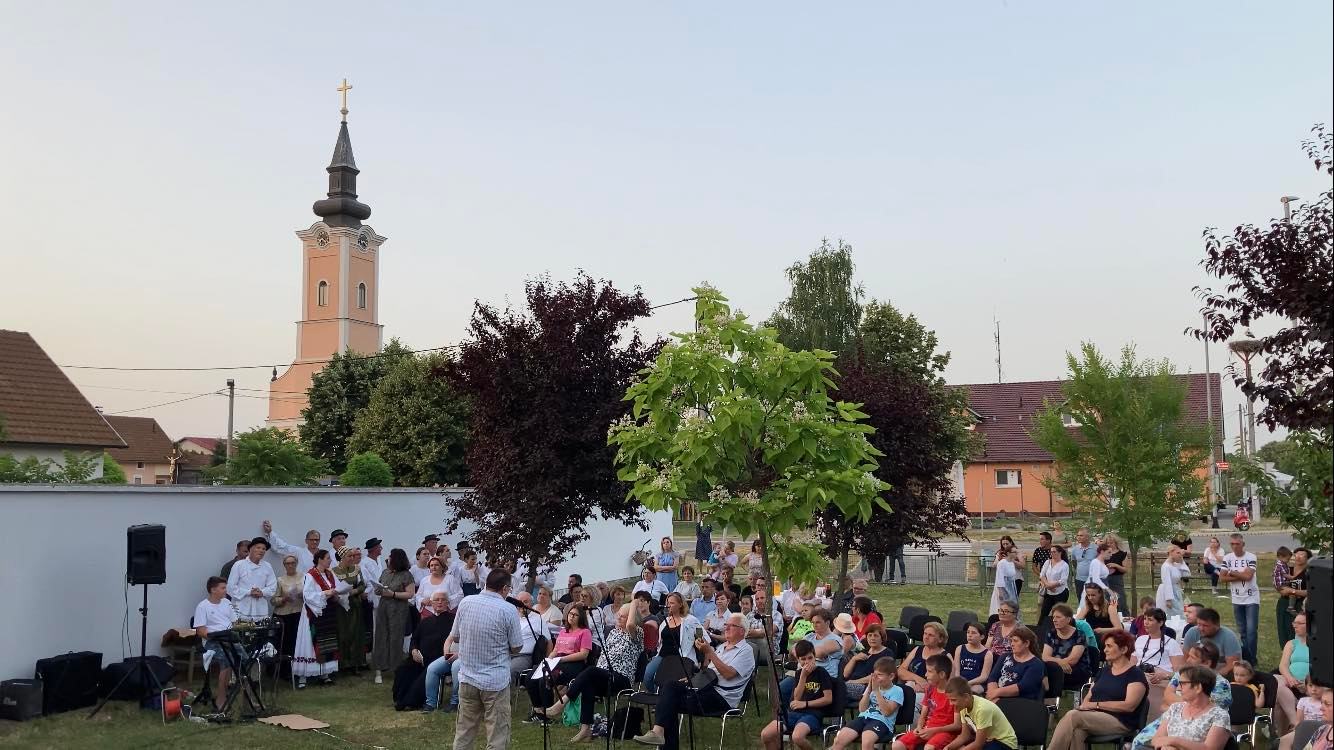
"Evenings with Poetry" in Cerić, (photo credit: Vedran Čuljak)
When did you discover your passion for writing?
I don’t talk much, a lot of the things I prefer keeping to myself and we were taught “if you don’t have anything nice to say, it’s better for you to be quiet.” I endured the war better while I was in it than when I came back to destroyed homes and a neglected village, it fuels the anger in you. That site slowly but surely built up anger and rage in me and I couldn’t express it to others nor me. Then, one time at the mass, I heard a priest talking about anger and saying: “Love your enemies, forgive!” How can I do that?! I realized that I need to forgive myself to let go of that anger. When I’m surrounded by so many good people, how can I be angry?! And those experiences fueled my inspiration for writing. Firstly, I started writing for myself. I write about the beauty and happy adventures of our lives and their residents. I felt sorrowful for not sharing my work with anyone, so I started gifting and selling my work to family and friends. When they liked and praised my work, I felt like I was doing something right. Also, I am part of the Folklore Society of Cerić "Slavko Mađar" and they always need new ideas or “old” ideas I realized that war kind of erased part of our history, people who “disappeared” from this place took the tradition and cultural heritage with them. Today, I’m sort of a keeper of memories in Cerić, one of the people who bring those old stories and memories back to residents and it, unfortunately, seems that people forgot most of them. I try my best to save and preserve that cultural heritage for children of the future. We have a very nice combination of us poets who write and the rest of the village who “absorb” everything we make. We give our poetry soul and actors from Folklore give them life.
Željko, do you think there are enough of these initiatives that have the mission of preserving and promoting Slavonian cultural heritage?
Folklore Societies are keepers of tradition and it’s well represented, not just in our region but throughout all of Croatia. Every village and town have their own Folklore Society. The question is, are people aware of them? Once upon a time, people were actually running away from tradition and it was an embarrassment to even be connected to these groups because everything else foreign was better. Then we realized during War that we miss sitting under the old mulberry tree while the spring sun is shining, harvesting our own crops and so many more things that make this region unique. Simply, all of the residents of Cerić realized that that’s the point - it’s nice to go abroad to a beautiful country or city but in the end, there is no place like home.
Do you have any of your original work published?
I have a collection of poems called Trace of The Soul (Trag Duše) which came out in 2019. It’s mostly poems about the war we experienced, adventures, and traditions Cerić offered and inspired me to write about. I wrote another book of poetry expected to be published near the end of the year, it should’ve been published before but COVID-19 slowed down the process. It’s easy to write for me since there’s a lot of inspiration around me like children going back from school, the boy who’s a head shorter than the girl but still carries her bag, and those kinds of stories make my writing worthwhile. Everything is simple and lively in this village.
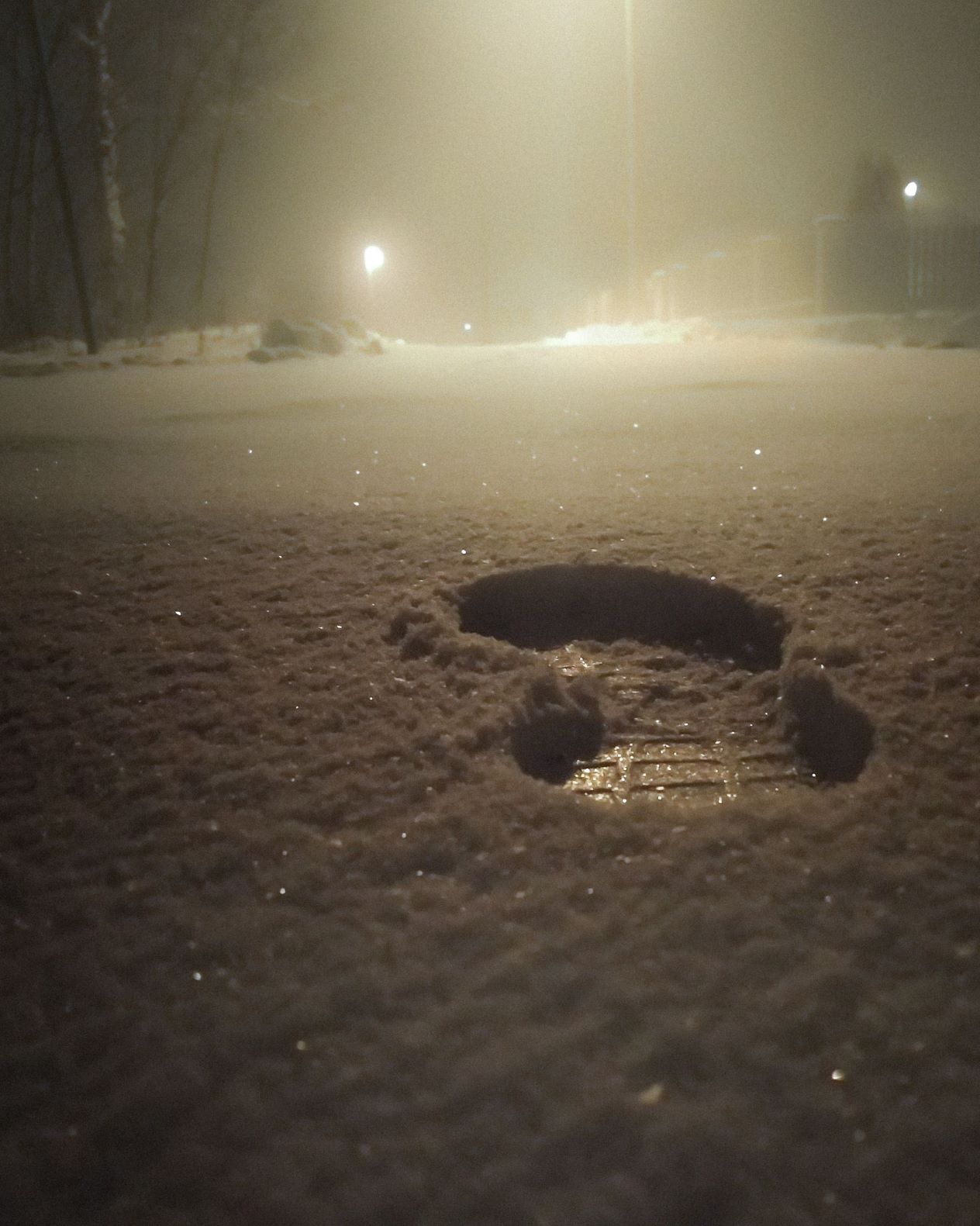
Original cover of "Pattern of the Soul" (Trag duše), Željko's published work, (photo credit: Vedran Čuljak)
Who’s your biggest critic?
My wife is my eternal inspiration to me haha AND my biggest critic of course. Everything that works and everything that doesn’t work she always tells me. She knows how to read my poem better than I! I don’t know how to interpret it when I write it! To me, it’s a blessing and brings me a lot of joy when every poem finds its own role, every person finds themselves in my poem, my story. We are extremely lucky that our whole village participates with us.
Can you tell us the events or manifestations that you organize every year in your village?
We have “Evening of Poetry” which is usually held during summertime at the end of June. It’s part of the celebration of our saint of the village, Ivan (John), or how we say it here, Ivanje. Usually held in the evening, residents gather and light up the torches, we sit on bales of straw in the middle of Cerić and recite our poems and stories. Residents and our guests also participate in the event and it’s such a beautiful celebration of Slavonian cultural heritage and traditions. We have one more event, the “Yearly concert of Folklore Society” which is held around Municipality Day of Nuštar. Local people criticized this manifestation since it was held on 2nd of the October which was the day Cerić fell in the Homeland War. We were accused of celebrating the biggest tragedy this village experienced in its history. What they didn’t understand is that we always celebrate life, coming back to our homes, all of those people who were exiled or have left us for other reasons and we do it with songs, socializing, being happy and that’s the most important part.
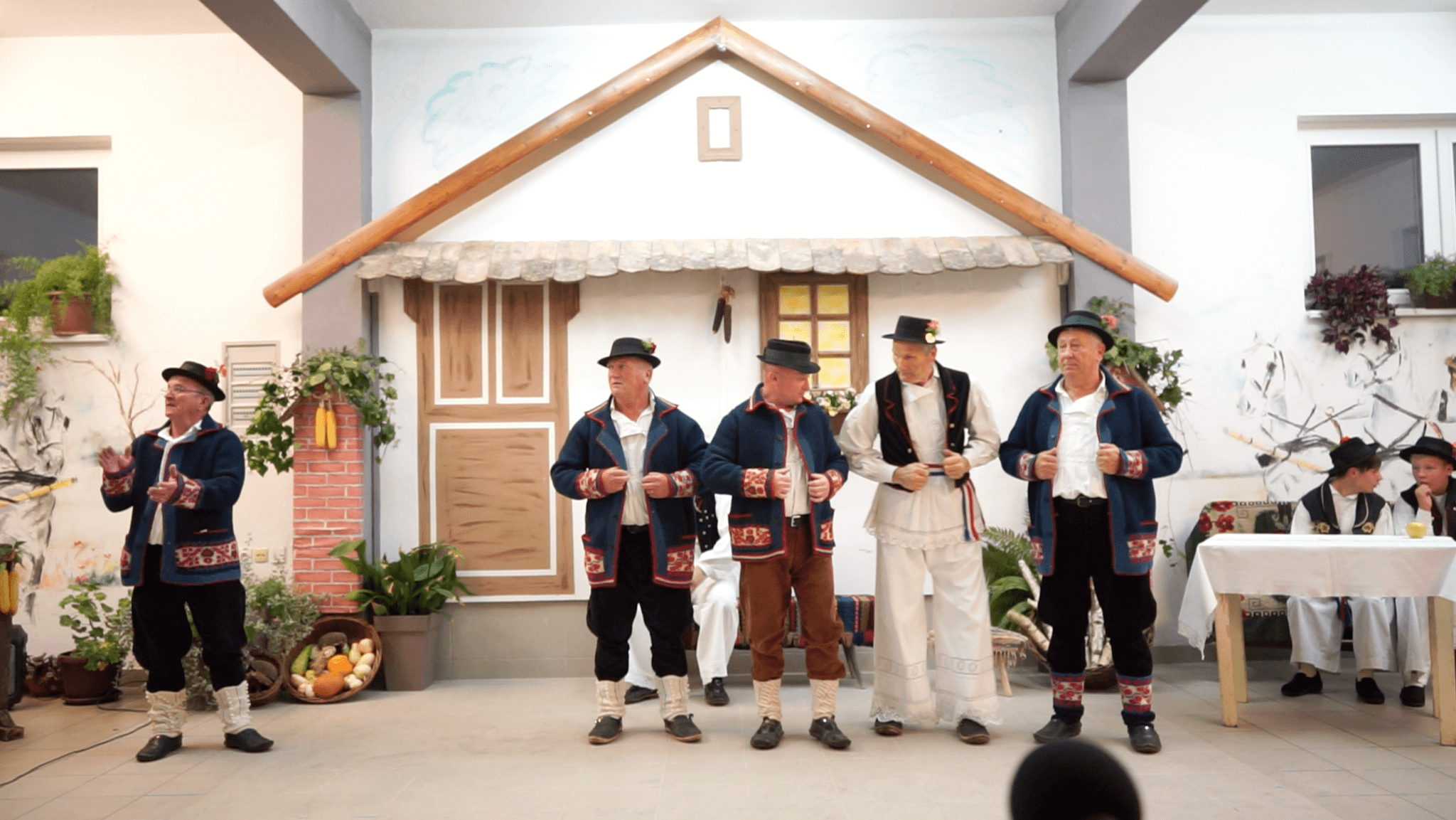
One of the manifestations celebrating the cultural heritage of Cerić and Slavonia, (photo credit: Vedran Čuljak)
As we know, Slavonia lost a lot of its residents in recent years, do you think that factor will affect your manifestations?
I don’t think so. Residents of Cerić notice our work as our guests as well. For example, we had a group of school children coming to our village as part of their trip, it was some kind of Vinkovačke Jeseni program and let’s just say the children weren’t that positive coming here. Why? Because they didn’t know what Cerić is, never heard of it and of course, they’re just not interested in those places, what can Cerić offer to them? However, after we hosted them nicely, organized nice lunch, their teacher, who was in charge, told us that this is the first time in her career that the children didn’t want to go home, they didn’t want to enter the bus and go. I know it’s a small sample but everyone who comes here, goes back home happy and they come back every year. There is still interest and to me, it seems it’s growing in the last few years.
Does that mean that there are successors and willing children to continue doing what you started? Promoting and persevering Slavonian cultural heritage?
Definitely! More and more children realized villages' worth, their traditions, and cultural heritage. Cerić and its residents are unbelievably close and connected, while other villages talk about the alienation of their residents from their heritage, we prosper every year more and more. When a child puts on our traditional folk costume (šokačku nošnju) and when you look at the photos of their ancestors in the same costumes, those children are vivid pictures of their predecessors, great grandmothers, great grandfathers, only the hair and clothes changed. Everything stayed the same. There are successors and always will be. They will never disappear!
Thank you Željko for your time! Can you recite one of your original Slavonian poems for the TCN readers?
From the poem "Slavonia, Mother"
"When I leave my homeland at dawn
I carry in my eyes a memory far from
far from the eye, to the heart, it's also hard
I will return once through tears, I said
.....
We'll meet again under the old oak
when the years close my dreamy eyes
until then I love you and always think of you
in my dream, almost every night I dream about you."
Events celebrating Slavonian cultural heritage mentioned in this interview are held in Cerić on the 24th of June "Evenings with Poetry" and the 2nd of October "Yearly Concert of Folklore Society "Slavko Mađar". If you're ever close and for instance, ever come to "Vinkovačke Jeseni", visit Cerić and their events, Slavonia, as always will welcome you with open arms.
For more, check out Made in Croatia.
Davor Nađi Interview: "Fokus Party Not for American-style Economy, Dutch or Scandinavian Preferred"
July 16, 2021 - One month after the local elections in Croatia, the liberal/center Fokus party president shares with TCN reflections of his Zagreb mayor candidacy, details on political views, plans, and hope for the future of Croatia. Learn more about the Fokus party in an exclusive Davor Nađi interview conducted by TCN reporter Ivor Kruljac.
2021 local elections for Croatia concluded back in June, and as with every local election, the majority of political parties whose candidates earned some new positions in the local governments managed to taste both victories and losses are overall happy. Some parties from both left and right political wings celebrated as scientists whose work won the Nobel prize. Even election losses were interpreted as victories, drawing attention to the number of votes, that although they may not score political roles, show growing support. If there is a once in four years occasion when political parties have as much optimism as the Croatian Adriatic has drops of water, it’s the local elections.
Currently in parliamentary opposition, Davor Nađi, president of the Fokus political party, politically declared as center-oriented, also doesn't hide his optimism following the result, but it seems he is a bit more toned down in that excitement than some of his political competitors. Satisfied to see his colleagues from the party keeping their previous positions, and some even selected for new ones, he is expecting the Fokus party to grow in the future while remaining aware of Fokus being new and young on the scene - is careful to say more than he can bargain for. Nađi ran for Zagreb mayor, but in the end, didn't manage to win neither the "main prize" nor a seat in the Zagreb Assembly. He noted, however, that his candidacy helped to attract new Fokus members in Zagreb, but again stating it without grandiose announcements, rather with mild optimism, careful not to step out of the line of realism.
In an e-mail interview, Nađi commented what happened in the Zagreb elections, did NGOs stepped out of line in supporting current mayor Tomislav Tomašević, and what do Fokus voters find attractive in the political party best known for reforming the town of Sveta Nedelja. Are they American-styles libertarians as described by some, and what European politicians are in line with Fokus’s ideas, are just some of the things Nađi revealed in the interview.
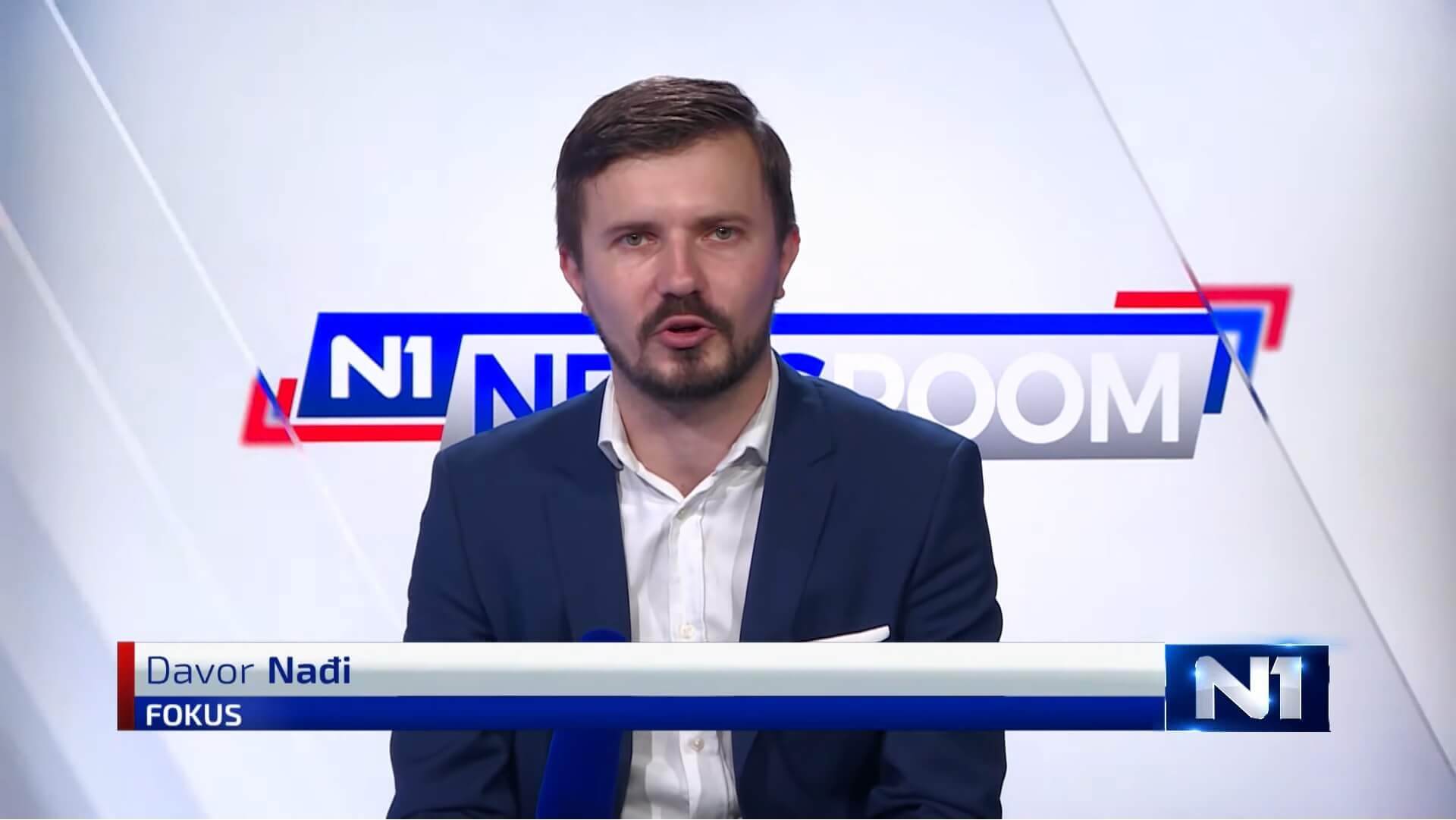
screenshot / N1
You are the president of the Fokus party, and candidates from your party had won in Sv. Nedelja, Samobor, Sv. Ivan Zelina and Dugo Selo. So, your party currently has four mayors. Can you list for our readers where your party had candidates for mayors, assemblies, and counties? How do you comment on „your mayor's" first-month post-election, and what moves would you point out as excellent in that time?
Except for these four cities, we also won in the municipalities of Križ and Pirovac. We ran for mayors and local and regional assemblies mostly in central Croatia (Zagreb and Zagreb county) but also in Čakovec, Slatina, Petrinja, Pirovac. We won 50 members of local and regional assemblies, including the president of assembly in Čakovec.
Most of our mayors were reelected, so they just continued working on projects. However, I would like to point out our new mayor of the city of Samobor, Petra Škrobot, who already contracted procurement of software for transparency of city budget and public procurement, which is one of the flagship policies of the Fokus party.
How would you briefly explain to our readers what your party represents and advocates politically? What politicians, foreign or Croatians are your role models, and why?
We represent the fight for lower taxes and fewer regulations for citizens and the private sector and for a more efficient public sector. That means that we want that people and companies can keep more of the money they earn for themselves and decide on what they want to spend it. For example, that is the only correct way to solve the housing problem – to make sure that people earn and keep more money. Further on, that means that the private sector gets better value for money through better service of the public sector where, in our vision, worst or/and unnecessary public servants would be let go, and the best workers would get a financial reward. We also talk and act on investments in infrastructure, which is important for preparing for future climate change challenges.
I can’t say I have some role models in politics, but I like the politics of Dutch PM regarding the economy because they have a small and efficient public sector that provides good service to their citizens. That allows them to keep their economy very competitive, which results in a better life for their people.
You express deep care for private investments, lowering taxes, and overall creating a better environment for private business and entrepreneurship. But, when talking about entrepreneurs in Croatia, people roll their eyes as many of our famous „entrepreneurs“ are associated with crime, corruption ties to politics, and unfair privatization that ended up in many people losing their job. What is your opinion on these entrepreneurs, such as Todorić or Horvatinčić? How to fix that negative perception of entrepreneurs?
Yes, the private sector is very important to us. We care about entrepreneurs but also about their employees. We also care about the best public servants too.
I think that public opinion on entrepreneurs is changing in a good way because of a new generation of successful entrepreneurs that succeeded in the global market with no connections to the government. Todorić and Horvatinčić are the exact opposite of them and represent everything that is wrong with this country. It’s wrong to call them entrepreneurs because they are a product of crony capitalism. The only cure to fight people like them is an independent and efficient judiciary.
New option for liberals in Croatia
You ran for mayor in Zagreb. The polls didn't give you too much of a chance, but libertarian (classical liberal) oriented site Liberal.hr said that you could be „the biggest surprise of the Zagreb elections“. To tell you the truth, it didn't seem likely you will become a mayor, but I was very surprised you didn't win a seat in the assembly. What went wrong in Zagreb, and how is it possible that the city with the most developed business climate and entrepreneurship (and with a lot of entrepreneurs) didn't reward your entrepreneurship-oriented ideas, at least with the seat in the assembly?
Well, Fokus is a new party, and I’m relatively new in politics, so a lot of people weren’t informed about our program and achievements. Fokus party didn’t exist in Zagreb until this year, while other parties were building their organization for many years, so it was hard to catch up in just a few months period during a partial lockdown. However, even though we didn’t win a seat in the assembly, we achieved some other goals. Now we have a lot of new members, and a strong organization in Zagreb and a lot of people have heard about FOKUS for the first time. Further on, we are the strongest liberal party in Zagreb, and we had better results than a lot of old traditional parties. So I believe that in the future, our support will only grow in Zagreb.
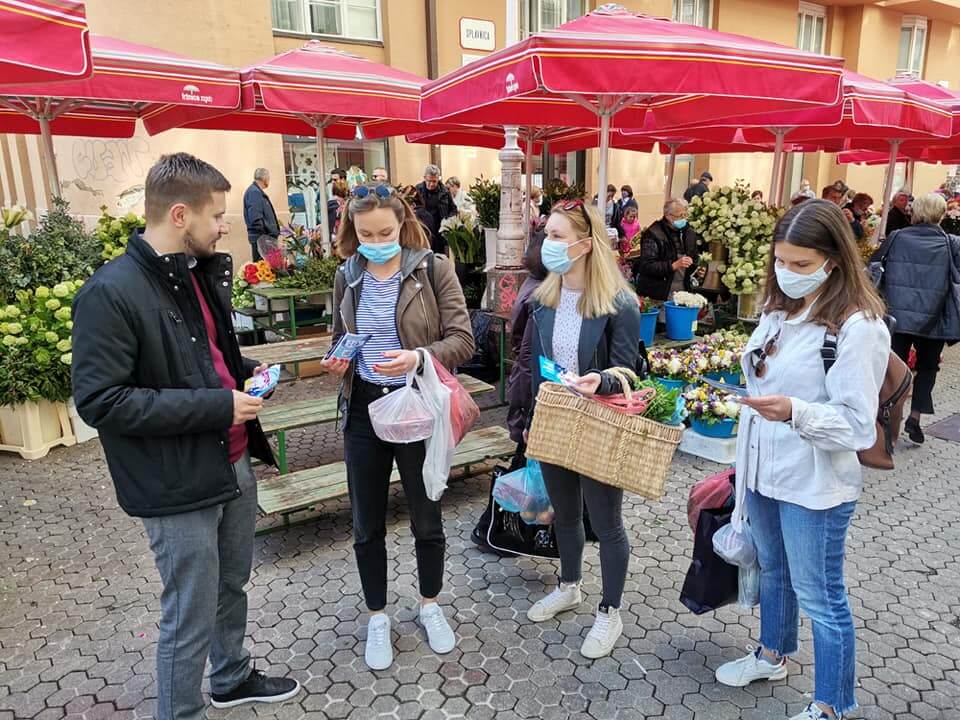
Davor Nađi during his campaign in Zagreb © Davor Nađi
You said on your Facebook site that you didn't receive enough media attention, and indeed you weren't invited to the debates (with the explanation being that only those who earned 5% in polls will be invited). However, you had banners and posters across Zagreb where you talked about how you are experienced to be a mayor because of Sveta Nedelja, where you were a deputy mayor, and the town did receive media attention few years back for amazing changes introduced there. What was your contribution to the transparency of public servants, lowering taxes, and canceling the subtax in Sveta Nedelja as deputy mayor?
I was the designer of those policies with the strong support of mayor Zurovec and the city council, and I was working on these policies from the beginning until the implementation. I’m very proud of that because Sveta Nedelja did the biggest tax cut in Croatia, became the most transparent city in Croatia, and received a reward for the best local economy three years in a row.
You criticized some of the moves by the new Zagreb mayor Tomislav Tomašević. Can you repeat what do you find problematic in his governance so far, but also, is there anything positive, something you would support him in if you made it to the Zagreb assembly?
There are some things that are good, and some are not. I reacted on one occasion, but let's wait a little bit more time before I can comment general impression so far.
However, for our readers who are foreign and didn't have the chance to see your comment in Croatian, can you briefly explain what did you found problematic with Tomašević early on to the point that you had to react publicly?
He stopped most of the public procurement. Even though I understand his concern that there might be corruption problems, that is not the way to solve that problem. That problem should be solved with better process and clear guidance from the mayor to the city administration because if public procurement is stopped for too long, there will be problems for citizens. On the other hand, in a short period of time new mayor will not be able to change much if he doesn’t make the process of public procurement more transparent and efficient.
Far from the US philosophy
Once on N1, you said political parties in Croatia are still pretty socialistic. Since on that occasion you were a guest at N1 regarding Zagreb Reconstruction Bill, did you mean they were socialistic just in that regard or in general? Are Croatians also socialistic too?
They are socialistic in general, and that bill was just the latest example. That orientation of political parties in Croatia resulted in a situation in which an enormous part of the economy depends on the state so we actually have crony capitalism. That sends the wrong message to the people, so people lose self-confidence and think they can’t earn for themselves and their families, and instead, they rely on the state to help them in every aspect of their life. They simply don’t take into account the fact that the state is corrupt and inefficient, which may be because of inadequate financial literacy.
However, it seems to me that the tide is changing with the lead from the local level from cites like Sveta Nedelja and that people are beginning to see the benefits of liberal policies.
When you say the parties are socialistic, some could think this is the heritage of Yugoslavia. However, aside from the communist experiences of South-Eastern Europe, the overall European political culture and tradition goes along the way „yes to democracy, yes to free market, yes to the individual freedoms“ but also „yes to social care, yes to free health, yes to free education, yes to supporting cultural and artistic projects, scientific research, etc“. Many people see Fokus as being against that and wanting to dismantle that European political culture with American political culture, which seems to be notorious in Europe for its health and education system, which as people see it, „is alright if you have cash, but not for the poor“. Are you indeed into „making Croatia American rather than European?“ and if so, how would you address the mentioned sectors of health, education, culture, and science? What about HRT in that context (as the idea of a public TV financed by the state is a European invention in the media landscape)?
Of course, we are not for an American-style economy. We prefer the Dutch or Scandinavian style with high economic freedom and adequate social benefits. Some people don’t understand that “free” health care doesn’t exist. Taxpayers pay for that. And if we think a little bit more about our health care system, do we really have health care that is accessible to the poor? How long are the waiting lists? People pay taxes for health care, and when they need it, then they don’t get it. That is not free health care! Almost the same is for everything else. I believe that vouchers would solve that problem because then even poor people could afford health care service from the private sector, and the public health care system would have to be more efficient and provide better value for money. The same thing is possible with education. HRT should be significantly downsized, and subscriptions decreased with the option to opt-out from their service.
When it comes to the overall Croatian political landscape, Fokus does offer something truly different from other political options, and it seems quite right to expect that Fokus will continue to grow. But, what do you think made Fokus uprise to start in central Croatia, in Sveta Nedelja, Samobor, Dugo Selo, and Sv. Ivan Zelina? Is there something that makes the culture and society in these areas different comparing to the rest of Croatia that they were the first to recognize and give a chance to your program?
Fokus also has a mayor of Pirovac in Dalmatia and president of the city council in Čakovec, members of City council in Slatina, etc, so I wouldn’t say that our policies are only recognized in central Croatia. However, we have better support in parts of Croatia, where fewer people work in the public sector and more in the private sector. That is not surprising since we promote policies that would result in a more efficient public sector and less red tape and taxation for the private sector.
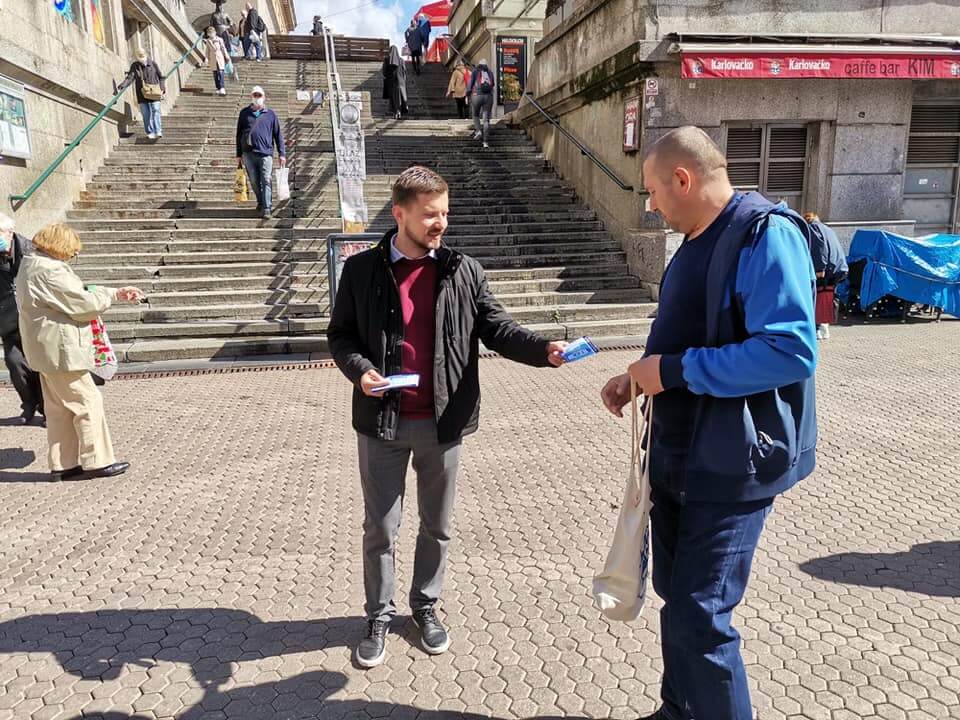 © Davor Nađi
© Davor Nađi
Up next: European elections and Croatian Parliament
On the note of local success, many view local elections as a forecast for what can happen in parliamentary elections. How would you rate your chances on the next parliament elections based on local results?
I’m very optimistic. Fokus has a very good position to grow and to achieve a great result. Fokus is already a success story and we have grown in a number of members in every part of Croatia. I believe that a new government after elections will not be formed without a strong party or coalition from the political center, and if we look at the results of local elections, Fokus is the fourth party by a number of mayors in Croatia. Also, we are the strongest party of the political center in national ratings, so that gives us reason to believe that we can gain even more support from our citizens in the future.
Back to the Zagreb elections. The two main candidates represented Gree-left values and national, conservative, sovereign values. Tomašević not only got support from some of the other European mayors but, just as with Škoro's values, there are plenty of same-minded people in Europe sharing those values. You mentioned your appreciation for the Dutch Prime Minister, but are you as well in contact with like-minded parties and politicians in the EU?
Fokus is a new party, so we still haven’t formed significant international alliances, but we can see ourselves working with other European liberal parties. Of course, the one with the best results is Dutch VVD that is in power on the state level.
But when we talk about the support that Tomašević or some right-wing parties and NGOs in Croatia had in recent years from abroad; I would say that there is a thin line between support and meddling into elections, and I would say that that line was crossed.
But, can we expect that Fokus will try to be in communication with them? Any plans for running on European Parliament elections as a good point to meet with other think-alike politicians in the EU?
I said that we don't have some significant alliances with them. However, we are in contact with some of them. We will see where that will take us. EP elections could be the first opportunity to test eventual cooperation.
And regarding what you said about there being a thin line between support and meddling in elections and how that line was crossed in Zagreb elections by NGOs, is there a risk of entrepreneurs doing the same thing when supporting, either financially or with public influence, certain parties? How can we prevent such meddling legally but yet with respect to the right of political expression to organizations and individuals?
I don’t see the financial support of Croatian entrepreneurs to political parties as a problem. The problem is only if they receive privileged treatment after the election in return for giving financial support. I would go one step further and say that we should welcome donations of private individuals and companies to political parties because that would mean that political parties would be less dependant on public financing. That should be a normal part of the domestic election process. However, if foreign money is included in financing political parties or their leaders, direct or through other channels, then we as a state have a problem.
To conclude, you are MA of the economy, and you talk a lot about economic solutions. Are our economy and business truly the core issues politicians need to address? Additionally, what are your views and the views of Fokus on defense policy, diplomacy, international relations, emigration policy (asylum seekers trying to enter Croatia), Croatian veterans, diaspora, and the ideological, historical disputes among Croatians, which for better or worse seem to often resolve the elections on a parliamentary level?
It would take a much longer conversation to answer all these questions, but I will try to answer in few sentences. Yes, I believe that economy is the most important issue that needs to be addressed because that is the place where value is created and which provides a better life for people and necessary funding for all government programs. Without a strong economy, the state can’t finance defense or social benefits. Unfortunately, you are right that elections are, in the biggest part, decided on other issues that target emotions rather than reason.
When it comes to defense policies, liberals believe that the basic tasks of the state are to provide to their citizen's rule of law and protection from foreign and domestic threats. So we should have adequate defense capabilities. On the other hand, we have no problem financing social benefits to real war veterans, however almost 30 years after the war, there shouldn’t be any new users of these benefits. Regarding international relations, our position is that Croatia should remain an EU and NATO member with strong relationships with the USA and with a clear position that China can’t be our partner until they don’t behave by the same rules like everyone else with the biggest concern regarding human rights issues.
Even though we are a small country, that doesn’t mean we can’t lead by example. It is up to us if we will stay on the bottom of every European statistic table or we will start going up. We have all the resources we need to thrive.
Learn more about Croatian politics and history since 1990 on our TC page.
For more about politics in Croatia, follow TCN's dedicated page.
Martina Bienenfeld: Zagreb will Become a Desirable Digital Nomad Destination
21 June 2021 – The Zagreb Tourist Board (TZGZ) organises the first-ever Zagreb Digital Nomad Week from the 21st to 27th of June after which the project called Zagreb Digital Nomad Ambassador will start. The latter will enable selected digital nomads to spend a month in Zagreb for free and share their experiences. A closer look at why Zagreb is a desirable digital nomad destination.
As translated from Seebiz.e, Zagreb Digital Nomad Week 2021 and the Digital Nomad Ambassador project TZGZ is organising together with Saltwater Nomads (a company specialising in organising digital nomads' stays in Croatia) and Total Croatia News (media portal).
It is these programs focusing on digital nomads that were the motivation for our conversation with Martina Bienenfeld, the head of the Zagreb Tourist Board.
SEEbiz: what was the main motivation behind deciding for the Zagreb Digital Nomad Ambassador program?
Bienenfeld: Last year changed the way of life for many people. The pandemic, which made working from home common, accelerated the trend of digital nomads and we now have generations of employees that are no longer bound by working hours, but wish to enjoy a more flexible way of life. Also, at the beginning of this year, the new Law on Foreign Nationals came into power. Under it, digital nomads can be allowed to stay in Croatia for up to a year on a non-resident basis. Zagreb, being the capital city, didn't want to miss out on this growing opportunity, so we've decided to organise Zagreb Digital Nomad Week and the Zagreb Digital Nomad Ambassador project.
SEEbiz: it is no secret many fast-expanding IT companies have their headquarters in Zagreb. Is this one of the reasons Zagreb is perceived as a destination for digital nomads? What are the prerequisites Zagreb needs to fulfil to become an attractive and desirable destination for this demographic?
Bienenfeld: That certainly is one of the reasons, but there are numerous factors that influence the choice of a destination. Above all, digital nomads are staying within one place as long as they can and want, and because they are working they value quick and reliable internet connection more than anything, which means the destination needs to have good quality telecommunication infrastructure. After that, they need good value for money and accessibility of co-working spaces. Nice weather is also high on the list. Also, proximity or at least easy accessibility of the destination is one of the conditions. Zagreb offers all these things. In this sense, the level of attractiveness of Zagreb is high and I believe there is potential to grow further, especially seeing how we are one of the first countries to regulate this type of work by law.
SEEbiz: Do you believe digital nomads are just a trend that is, among other things, here because of a global pandemic or is it something that will remain after this situation has subsided?
Bienenfeld: Assessments and research suggest more and more people will want to work independently like this in the future. In other words, they will want the freedom to travel and the ability to work where ever they are at any given time. Therefore, I believe this is not a passing trend, but a new style of working and living that will remain long after this situation.
SEEbiz: The Croatian Tourist Board (HTZ) digital nomads campaign “Croatia, your new office!” garnered great results in the first two months. What are you expecting from the projects taking place in Zagreb?
Bienenfeld: I’m expecting Zagreb to further improve its position as a desirable destination for digital nomads. Croatia’s capital can surely be positioned as a centre for digital nomads and draw in foreigners coming for work and leisure.
SEEbiz: Zagreb has been recognised as a city break destination. In spite of all the restrictions, Zagreb was a good host for Croatia Rally, and then there is also the World Rowing Cup. Is sport, professional or recreational, one of the ways of attracting digital nomads?
Bienenfeld: As I mentioned before – you always need a combination of different factors in order to attract digital nomads. Generally, when speaking of sporting events, we have to be aware they are one of the most important ambassadors of any country or the city in which they are being held. We at TZGZ are especially pleased Zagreb hosted such huge sporting events – World Rally Championship and World Rowing Cup – during these times of uncertainty. This points to the significance of our city in the segment of sports tourism as a special part of the travel industry which contributes to the creation of new quality and competitive position in the travel market. Namely, events like these cast a spotlight on the host destination and make organisers of other similar events across the world consider organising their future events in the same city or country. In the same way, the effects of such a synergy of sports and tourism add to the popularity of the destination hosting these events and represent one of the best ways of promoting Zagreb as well as Croatia.
SEEbiz: Zagreb Tourist Board saw a focus on developing new digital platforms proving successful. How do you view the importance of digitalisation in tourism?
Bienenfeld: Tourist Boards always kept pace with new technological trends and implemented them readily into their projects. We need only remember Zagreb Be There app developed in now distant 2014, which was a multiple award-winning treasure hunt sightseeing app, or QR code city tour implemented in 2013. The pandemic and, unfortunately, Zagreb earthquakes, taught us the importance of being able to respond well and quickly to new situations, follow trends by using digital tools and platforms, and adjust our tourism offer to new conditions. We have turned to digital innovations that allow us to add value, attractiveness, but also visibility to our tourism offer. A recent example is the interactive AR project Virtual Christmas Windows, in which we were first in Croatia to apply augmented reality technology in our Christmas festival awareness campaign. Digitalisation in tourism is imperative today. Tourism and technology are tightly intertwined and travel is unthinkable without digital technology.
SEEbiz: The Around Zagreb project and cooperation of the Zagreb Tourist Board and Zagreb County Tourist Board is one of the first big steps in strategic destination development in Croatia because the focus is on quality content and finding new benefits for tourists, seeing how it promotes quality tourist-focused content in Zagreb’s surroundings or only half an hour from the city centre. Zagreb and its surroundings as a unique green destination, is this the strategy for the post-pandemic period?
Bienenfeld: I’m glad you’ve asked me that as we are just starting with our refreshed campaign in cooperation with the Zagreb County Tourist Board, and soon we will go ahead with Krapina – Zagorje County as well. Project Blizu grada, blizu srca (Close to the City, close to Heart) / Around Zagreb is created with a long-term goal and vision and we would like to have started it even without the pandemic situation. It is natural for Zagreb and its surrounding area to promote together because guests do not care about our administrative borders. They are after quality and interesting content. The pandemic in a sense helped the campaign along because guests are now, more than ever, searching for the options of spending time in nature, on fresh air, surrounded by greenery, all combined with diverse local culture and gastronomic offer.
Last year, most of the visitors to www.aroundzagreb.hr came from Croatia (40%), but also from the markets where the campaign was run – Slovenia (35%), Austria, Germany, and Bosnia and Herzegovina (25%). Interestingly, we are seeing a rising interest from the American market as well, even though there was no advertising campaign specifically aiming at that market, which represents a guideline for future activities. Inspired by the success of the campaign so far, recording over 37 million views, we have improved our platform and are showing it to the important markets again. With this in mind, along with refreshed visuals and itineraries, we have started a new section called “Did You Know?” which showcases various interesting points from our surrounding areas. Besides that, we also have cooking videos featuring authentic local cuisine recipes from Zagreb and the surrounding area. They are made by the famous Croatian chef Mr. Almo Catlak. He set out to present local delicacies to a wide audience with an emphasis on tradition with a bit of a modern approach. We are now starting the campaign for the markets of Austria, Bosnia and Herzegovina, Slovenia, Serbia, and Germany and soon we will be updating it with Krapina – Zagorje County materials. I would hereby also like to give my thanks to all involved in this.
SEEbiz: Zagreb is also an airplane destination. What effects do you expect as a result of RyanAir coming to Zagreb Airport, or how important in this respect is the survival of the national airline company?
Bienenfeld: We welcome all new airlines coming to Zagreb and will be glad to see the RyanAir airplane “tales” among those of other companies already landing in our city. This will contribute to the further positioning of Zagreb as a city break destination and will make it more accessible to interested visitors. As far as the national carrier is concerned, we mustn’t forget it was Croatia Airlines that connected us to the rest of the world when all other companies stopped flying here during the toughest pandemic restrictions. In this sense, I wouldn’t compare these two airline companies because their profiles and business models are vastly different.
SEEbiz: We know we are living in very uncertain times, but at the end of the interview, let me ask you: What is your vision for the long-term tourism development of Zagreb.
Bienenfeld: We need to keep in mind it will take a few years after the pandemic for tourism to bounce back. The earthquake made things even more difficult because it damaged a variety of buildings, some of which contribute to tourist offers or architectural and urban distinctions of the city. The state of tourism will depend on the organisation and readiness of the destination to adapt to new conditions and provide solutions. Further development of tourism in a smart, responsible and sustainable way will depend on how much are we as a sector prepared for new challenges. From the perspective of tourism, it is clear more and more travellers take into account ecology and sustainability, and we, therefore, need to apply sustainable concepts in order to potentially make them into one of the key promotional factors.
Also, it is important to activate underused tourist resources and continue to develop key tourist products of the destination. With the goal of defining a stronger position in the travel market in this context, it is necessary to support innovative and creative development initiatives that contribute to further building of the destination as a centre for urban, regenerative, and cultural scene and encourage dispersion of tourist activities. For the MICE segment we are expecting a slower recovery, but we need to continue communicating with the organisers of conferences and events and position Zagreb as a regional centre for business meetings, gatherings, and conferences. I see additional potential in health tourism, sports and active tourism, and of course food tourism. In any case, what is important and we’ll continue to insist on is that Zagreb is and always was a people’s city.
For more on Digital Nomads in Croatia, click here
Checking In with Dubrovnik Digital Nomads-in-Residence – Kelsey Kay Love Interview
May 8, 2021 - Dubrovnik Digital Nomads-in-Residence program is well underway with our digital nomads seriously getting to work on ideas and suggestions on how to improve the local nomad offer. We caught up with Kelsey Kay Love to get her opinion of living and working in Dubrovnik.
Digital nomads in residence are creating and sharing their vision of a nomad-friendly Dubrovnik. They are paving the way for their colleagues who will follow after them. We are catching up with them and chatting about their impressions so far. Today, we are talking to Kelsey Kay Love.
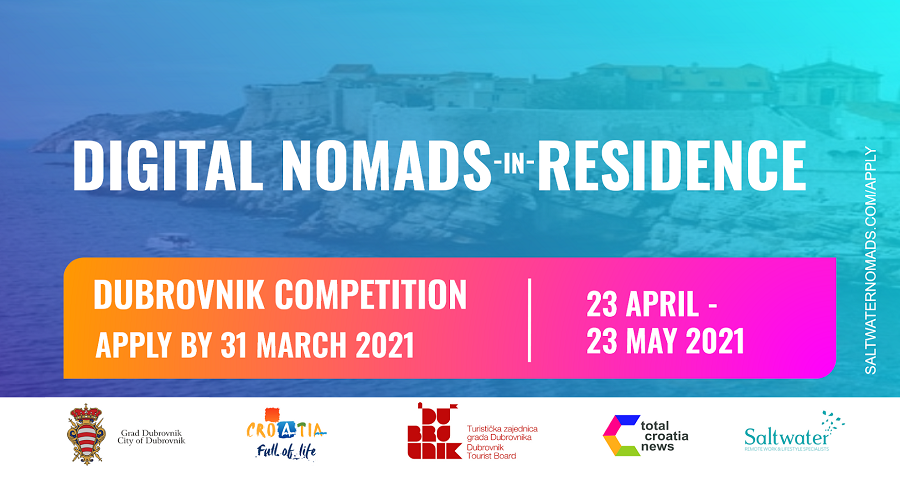
It is hard to imagine a group of people that wouldn't want Kelsey as one of their members. This Dallas Texas born digital marketing expert, travel writer and brand manager lives life to the fullest. She is a world traveller with a gift of contagious positivity. Kelsey is currently busy working as a brand manager for SelvaRey Rum Company, co-owned by Bruno Mars. That didn't stop her from applying to Dubrovnik Nomads in Residence program.
After searching for digital nomad options around the world she realised there was a possible option for applying to a program in Dubrovnik. Croatia was already high on her bucket list as a destination so she decided to apply. And the rest is history.
Living in Dubrovnik
Although she works full time Kelsey manages to enjoy Dubrovnik. She spends her days getting to know the local culture of living and local people. She enjoys activities and tours done with her fellow nomads in residence and is rapidly building a good understanding of what it's like to live and work in southern Croatia. Being a lover of boats, Kelsey is right at home in this ancient seafaring community.
In a short interview below Kelsey reveals her likes and dislikes when it comes to being a digital nomad in Dubrovnik. She also chimes in as to what the next steps for the local community need to be. Her varied list of interests helps her enjoy the width of the Dubrovnik experience and some of the things the area offers outside of the beaten path. Check out the interview below and pick up some of that Kelsey Kay Love positivity.
You can learn more about the Dubrovnik Digital Nomads-in-Residence program here.
Here is Kelsey's application video.
Saltwater Nomads' Tanja Polegubic on Dubrovnik Digital Nomad-in-Residence Program
Dubrovnik Mayor Mato Frankovic on Digital Nomads, US Flights, 2021 Season
For the latest digital nomad news from Croatia, follow the dedicated TCN section.
VIDEO: Zagreb Earthquake 2020, One Year Later
March 22, 2021- On the Zagreb Earthquake 2020 first anniversary, TCN reporters Ivor Kruljac and Jose Alfonso Kusijanović took to Zagreb's streets to see how locals feel one year later.
6:24 AM March 22, 2020. It was Sunday, but sleep was as light as it was a workday full of obligations. Zagreb's citizens were awakened by a horrible sound followed by walls shaking, the ground trembling and things falling all over the place. Amid the coronavirus pandemic, at the very end of the first week of the first lockdown where it was advised to stay indoors to prevent the spread of the virus, there was no choice but to rush out of the house, discombobulated and without a clue of what exactly is the damage that 5.5 magnitude earthquake did. Individuals, couples, and entire families were outside but at a distance from one another, and just after the first aftershock, it started to snow. If you didn't leave the very center of Zagreb, the first sign of damage was the cathedral, whose top of the left tower collapsed, and only later you started to see the images of the center, which many compared online to Beirut. The Covid-19 National Response Team expressed its condolences on TV but warning everyone to keep the distance due to corona. Emergency services rushed to the city, later followed by the army. People who lost their homes were taken to student dorms and other locations with free space in the following days. Sadly, a 15-year-old-girl was fatally injured during the earthquake and passed away at Klaićeva's Children Hospital.
One year later, citizens of Zagreb still have mixed feelings about the event. Here are their answers in our short interview.
Shaking the memory
Senior citizen Ljerka was walking around European Square. Her home survived the quake, and the aftermath was books that fell from a shelf and broken bottles and jars in her pantry. She learned about that damage after a few days when she returned home from her sister's because she was too scared to be alone. The memory of last year still gives her the chills. „I jumped out of bed and lost my head; you have no idea where to go. You don't know what to do. I quickly grabbed something, half-dressed, rushed to the street. People were standing outside confused who didn't know where to go or what to do, nothing“, she said. Describing herself as an optimistic person, the scary experience is still stuck with her even one year later. „You remember it from time to time, but you can't forget it," said Ljerka.
A young guy named Dejan Jakovljević was casually walking around a crowded Dolac market, carefully with a mask to respect the measures in the crowds. He handled the earthquake pretty well as he lives in a new building with lots of concrete and reinforcement.
„It woke me up, but I knew it was an earthquake. It didn't scare me. I just waited for it to be over“, said Dejan. Responding to how he feels about it one year later, he briefly acknowledged that he „honestly forgot about it. “
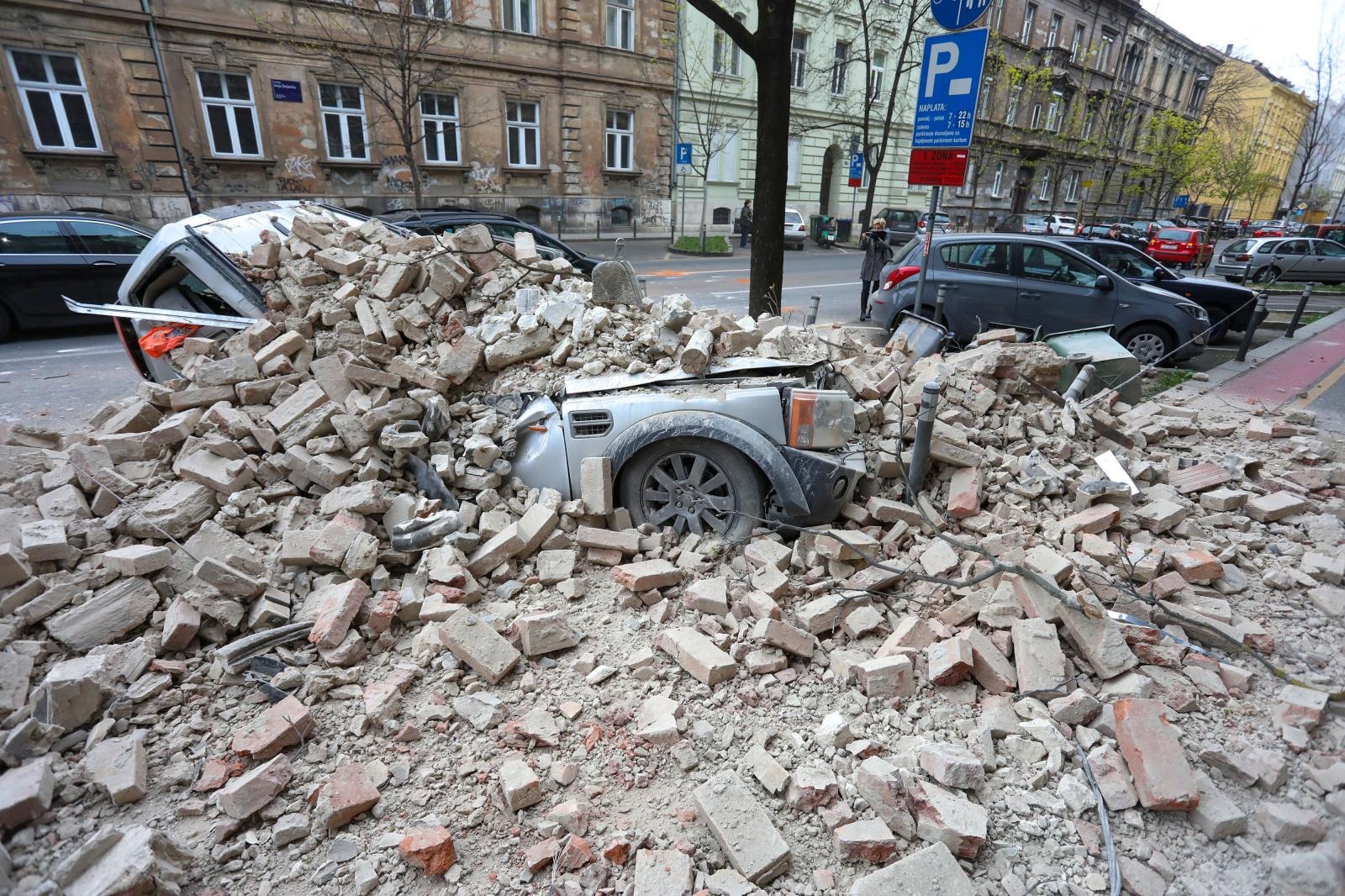
Borna Filic / PIXSELL
The same can't be said for American-born Stefanie Mikac from New York. We met her while she was walking her dog in Zrinjevac park. Her home was badly damaged. „I was in the bathroom dancing left and right. I didn't think it was an earthquake, I thought 'what is it, the devil had come!’ and there was smoke“, remembered Stefanie. When she realized it was an earthquake, she hid under the door, and when it passed, she searched for her dog that hid in the apartment before finally escaping her flat. On her trip to Hawaii, where earthquakes are quite frequent, she accepted that there is not much you can do against mother nature. Despite her bad experience, a year later, she feels safe in Zagreb. „Very secure, safe. You know, you have to take things as they come, “ said Stephanie sharing her positive attitude.
We spotted Mira Francem walking on Jelačić square. Her house was built following all the construction demands and proved to be earthquake-proof. Still, the rocky feeling isn't something that she liked. „I personally felt terrible. I had a feeling the whole world was collapsing, and in the end, that feeling of losing the ground under my feet is an instinct, you know?”, said Mira adding that even though her house is fine, the trembling ground was awful. When asked if there is still anxiety over the last year's event, she resoundingly repeated, “yes.”
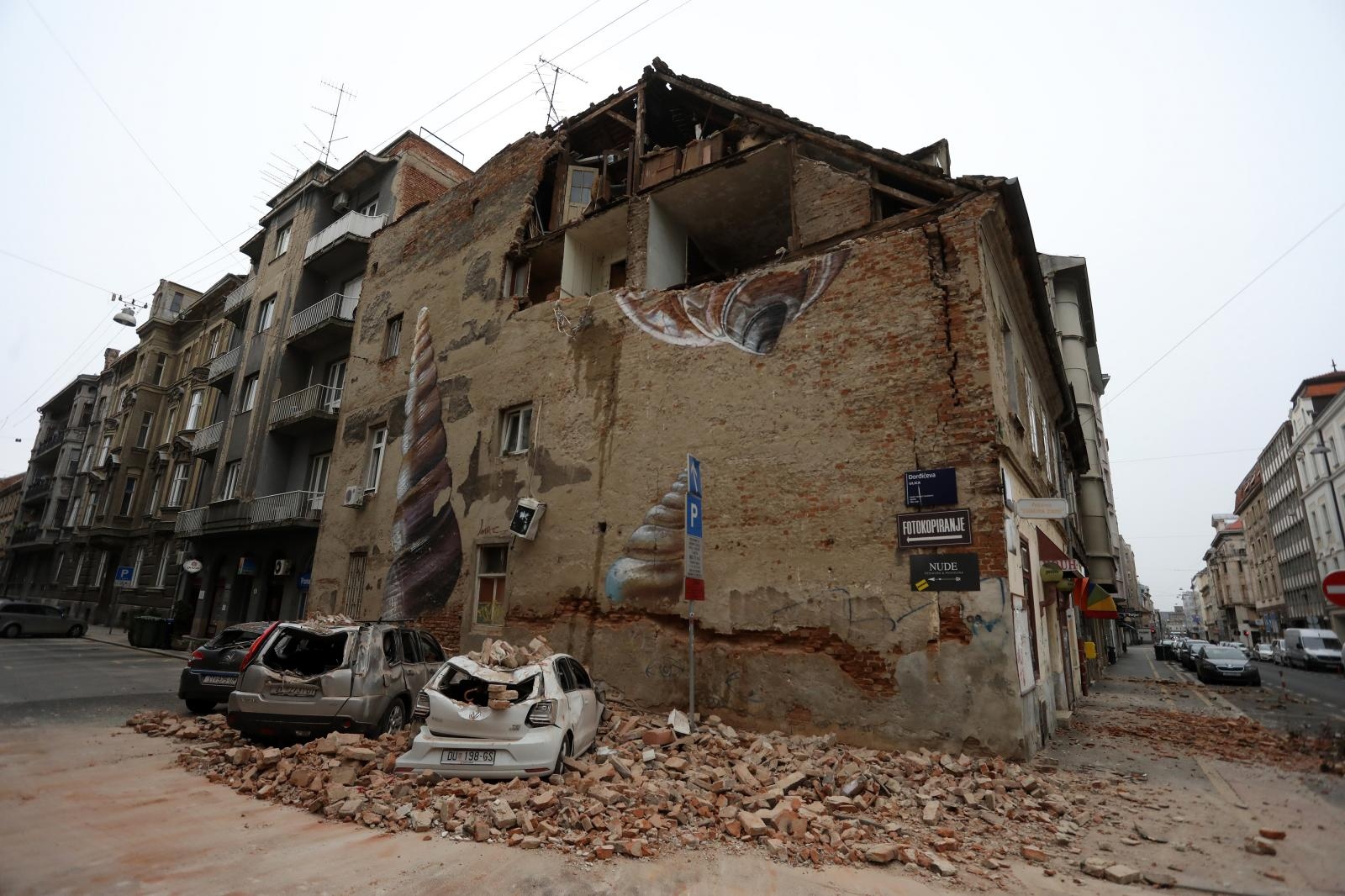
Borna Filic / PIXSELL
Mladen Habuš was standing on Vlaška street that connects European Square with Kaptol, where the City's cathedral is located.
“My home was okay. The earthquake surprised everyone at first, but fortunately, they don't last, so you stabilize psychologically”, said Mladen calmly, as if it didn’t really leave an impression on him.
“I already forgot about it because it's not as frequent as in Glina or Petrinja, whereas they say, it shakes every five minutes,” he emphasized, and that the key is to remain relaxed.
December – another round, another rumble
The second earthquake with a 6.4 magnitude that hit Petrinja and ravaged Banovina / Banija didn't damage Zagreb as it did to the southern part of central Croatia. Still, it was certainly felt, and many agreed it was stronger than the one in March.
„Jesus Christ! That one was even worse!“said Ljerka the second I mentioned the Petrinja earthquake. She learned that Zagreb is situated in a seismic active area, and earthquakes are something people in Zagreb need to learn to live with, but March didn't make her welcome the December tremble with more ease. She ran out of the house, not knowing what when her niece, who also lives in Zagreb, called her.
„I asked her if there was another earthquake in Zagreb. I didn't get anything. She said, 'no, that's the aftermath of Petrinja.' We are really close to Petrinja“, said Ljerka.

Nikola Cutuk / PIXSELL
Stephanie was walking her dog during the Petrinja earthquake. She witnessed bricks falling and was relieved nobody was passing underneath at the time. However, when she returned home, she entered the mess, and the damages that were still not fixed from March intensified. „All the cracks are wider now, and everything will need to be taken down to get to the healthy wall,” said Stephanie.
When asked if the December quake was easier or the same to handle for her, she laughed, acknowledging that it was actually worse. “We repeated the reactions from the first earthquake, you know? It's a very unpleasant feeling even today when a tram passes or something buzzes. I think something is trembling, and we are quite tense”, shared Mira. She said that no matter how rational you are, consequences as emotions are different from rationale. “I'm really sorry for those people. My house isn't damaged, but I was scared and lost, and I can only imagine how those people felt. It's a huge catastrophe on which we cannot influence,” said Mira with empathy.
Dejan felt the December quake was stronger but feeling safe in his building; he wasn't too worried. “I instinctively rushed to save the TV. Everything else was irrelevant”, recalled Dejan with gentle laughter underneath his mask.
Despite Mladen being relaxed after Petrinja, anxiety crept up on him too. “You start listening; someone starts a car, you raise your head to see what's going on. You are expecting another earthquake”, said Mladen. Still, he added that “you get used to it.”
Insurance vs. safe building
As revealed earlier this year, 85% of Croatian households don't have earthquake insurance.
Dejan doesn't know if the building had insurance but given his building proved safe, he didn't seem too concerned with that question.
Mira also didn't have insurance, but her investment in the safe building certainly paid off.
Stephanie's home was badly damaged, but she pays 1200 kuna annually for insurance and says it isn't too expensive in Croatia. However, regarding the walls in her home that need to be fixed, there was a bit of an issue. „The insurance company actually secured only the furniture, but then through a lawyer, we made a deal to cover half of it. Something is better than nothing“, said Stephanie.
Ljerka complemented her landlord and how she manages things. Her building received a green sticker but chimneys needed to be removed. Insurance helped there a lot. „We took down the chimney ourselves, and we got the money back, I think 3000 kuna, “ said Ljerka. The roof was renewed a year or two ago, but the same couldn't be said about the terrace residents have in the back of the building. Insurance didn't want to cover it, and a loan was needed to be taken for the fixture.
City officials to the rescue! Or not?
Both the country and international community, not to mention companies and individuals, rushed to help Zagreb, and the now-deceased mayor Milan Bandić found himself challenged to return Zagreb to its old glory and shine as fast as possible. The situation even called for a Zagreb reconstruction bill on the parliament level as the government took the lead in rebuilding the city. In the meantime, Bandić passed away, and with local elections coming up, the city's repair remains a topic for all the candidates that hope to take the lead chair of city politics in May.
Regarding the response of the city officials, Ljerka isn't happy.
„What did the city do? Nothing. It was all ruins. Look at what Zagreb looks like now after the earthquake. How long has passed, and nothing is done. Nothing. Only the houses that people renovated themselves, but the city gave nothing”, commented Ljerka. She did, however, add that the city doesn’t have money and that she understands that.
Mira shares Ljerka's opinion that the situation is better for those who organized repairs privately. Still, when it comes to the city authority response, she says, „it should have gone faster, better, and more organized. “
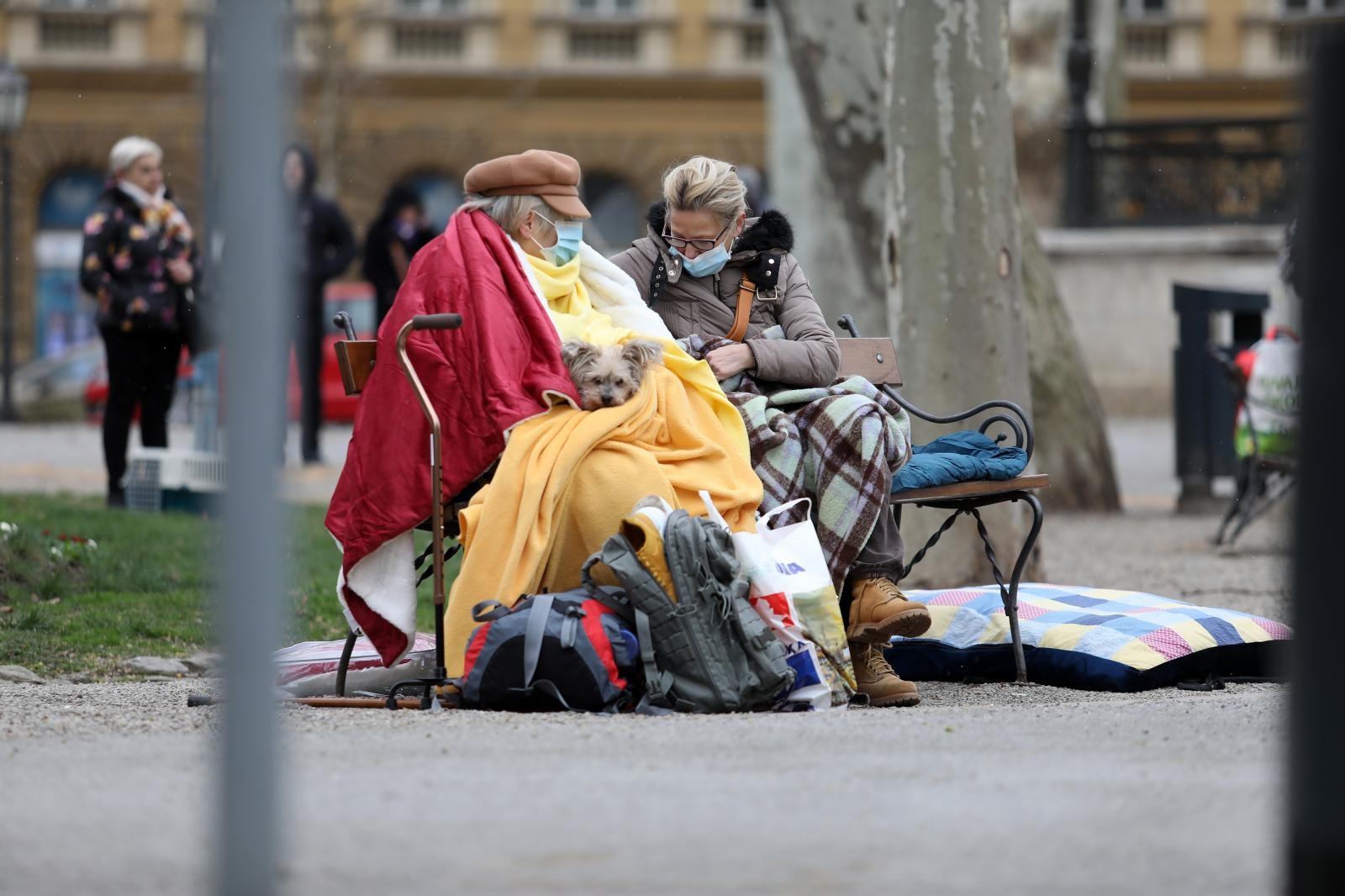
Borna Filic / PIXSELL
„I see a lot of my friends who live in the center. It's all at a standstill. For those who engaged themselves privately, it is better, but otherwise, it is prolonged. It needs to be better, more active, more engaged to ease the people and make them stronger."
Dejan also thinks that the authorities' response was not good and that “they should help people.“
When asked to comment on the city's response to the earthquake damage, Stephanie was hesitant at first. She feared many people would disagree with her opinion and her different way of thinking because she lived in the US.
“Over there, we have asbestos insurance and insurance for everything. If you have a bank loan and the bank has input on the house, you have to have insurance”, explained Stephanie asking me if it is fair for her to pay the insurance while others don’t and later demand the city to pay for everything. “Imagine if the city would fix apartments for everyone and secure the buildings. Nobody would ever do that anywhere. They may give you a percentage, but that's it,” concludes Stephanie.
Mladen is happy with the city's response.
“I think the city, to my knowledge and how much I followed, was the only one that jumped to help those who lost their homes and put them in free spaces,” Mladen pointed out. He also reminds us that the government took over the rebuild and the city is involved with 20%. When asked if it’s good for Zagreb that the government took the lead over the city, a resounding yes was the final answer. “The city doesn't have enough money, so the government needs to jump in," concluded Mladen.
Steady ground wishes above all
Being the biggest and the capital city of Croatia, which attracts people from everywhere in the country and beyond, Zagreb streets offered truly diverse answers to Jose and me. There was more or less fright on March 22, 2020, and different levels of anxiety today. Different views on insurance and the city’s response. We can only guess how differently they will vote in May. But one wish is the constant for the Purger's hearth - the wish to see Zagreb as a safe city where you only get awakened by an alarm clock.
For more about the earthquake in Zagreb, follow TCN's dedicated page.
Interview with Lana Ključarić: Tracing the Slavonian Artist
A talented artist from Osijek, Lana Ključarić, is a regular guest at different artistic happenings in Slavonia and Baranja, but her work has also drawn the attention of an audience beyond Croatia.


